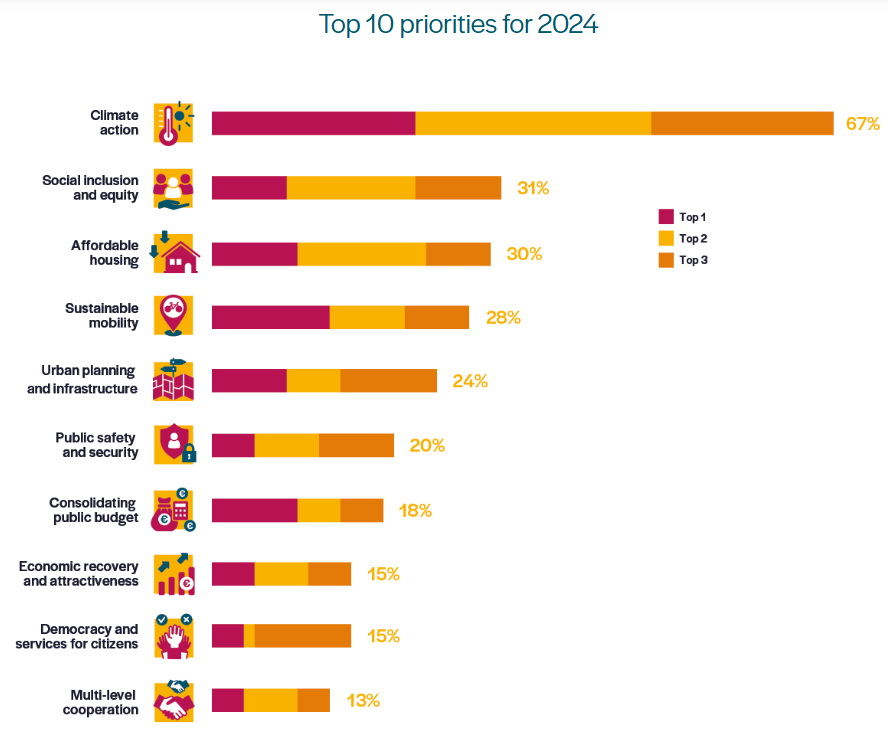Taking the Pulse: Policy Priorities for Mayors of European Cities
Local political priorities respond to global events and other levels of government
The latest survey of city mayors’ priorities for 2024 has been published by Eurocities, an organization with over 200 member cities spread across Europe. The survey drew responses from 92 mayors and highlights the issues which mayors see as needing the most urgent action and provides some insight into the issues which confront them in their attempts to deliver solutions for their cities. The 2024 survey is the most recent in an annual series of the Eurocities Pulse Mayors surveys. The series is beginning to throw some light on the evolution of cities’ priorities as they respond to changing events, social and economic conditions, and the policies and pressures from national governments.
Emerging priorities
Whilst the range of policy issues has not altered greatly in recent surveys, the relative priorities between topics has significantly changed. Most obvious is that the immediate pressures on European cities arising from the Ukraine war such as food and fuel insecurities and from the Covid pandemic which were very prominent in 2022 are now much less so. For example, the cost of energy and energy supply which was the top concern in 2022, by 2023 was down to 7th place following EU intervention during that period.
The 2023 survey saw the inclusion of urban planning for the first time (in 10th place) and the rise of inequalities as a prominent policy concern in 5th place. High in the 2023 priorities list was climate, housing, mobility and budgets and administrative capacity.
The latest survey of priorities for 2024 shows further change. Whilst climate concerns, embracing such issues as water supply, extreme heat, climate adaptation and decarbonization and net-zero emissions, remain the clear top priority for 65% of city mayors, social inclusion and equalities is now in second place, followed by affordable housing. The full list of the top 10 mayoral priorities for 2024 is as below.
The urgency now surrounding social inclusion, inequality and access to housing seems to reflect a growing awareness of the risks of increasing poverty and of the difficulties cities face in maintaining adequate municipal capacity for social services to support those most directly affected by the cost-of-living crisis and inflation. Mayors also expressed concerns about ensuring access to digital services and the impact of the ‘green transformation’ on different social groups.
The high priority attached to affordable housing is a reflection of high rental and housing costs, with consequences for the accessibility of adequate housing. Models of housing provision vary widely across different countries within the EU, but for many resourcing the provision of social housing presents real challenges.
Delivering on priorities
The survey also provides insights into issues which help or hinder cities’ ability to implement policy responses on their priority themes. The capacity to consolidate city budgets in the face of the diverse programmes of different levels of government remains a concern continuing from 2023. Mayors see scope for much greater multi-level co-operation to boost the scope and effectiveness of initiatives in service provision and in relation to improving infrastructure and sustainable urban mobility. The diagram below, taken from the Eurocities report conveniently summarizes the issues of concern.
Wider lessons
It seems probable that cities in all parts of the world, and not just in Europe, find themselves faced with a very similar list of issues requiring urgent attention. Doing so is probably beyond the capacities of cities acting alone. A recurring theme here and elsewhere is the necessity of consultation and co-ordination between different levels of government and government agencies to maximize the effectiveness of limited resources.
A further lesson which mayors highlight in the Eurocities reports is the potential for the input from cities to national level policy development to improve the relevance and flexibility of policy solutions. Cities are close to the social and economic issues faced by their residents and businesses. Cities deserve a place as serious players in national and local policy-making.
Further reading
For more details of the Eurocities Monitor see here.






